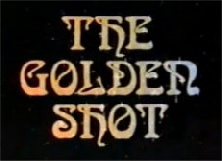
TV Pop Diaries
Pop Music on British Television 1955 -
Missing the loss of the wildly successful Beat The Clock portion of Sunday Night at the London Palladium ATV had not really filled that gap with a suitable replacement. Hughie Green proved himself the king of public participation shows, but an opportunity came ATV’s way that they didn’t expect and one that would eventually threaten Green’s crown.
ATV had been offered the chance to licence a successful West German game show, Der
Goldene Schuß in which a contestant guides a blindfolded marksman around a wall-
ATV played a teaser episode of the show on 1st July 1967 in order to find the four studio contestants for the following week, with the first edition proper on 8th July, when the show took the coveted front cover of the TV Times. The show was initially guaranteed a thirteen week run.
Canadian singer Jackie Rae was the first host, but despite his professionalism it was felt he didn't have much of a rapport with the contestants and the audience. A guest on the first series, Bob Monkhouse was then chosen to replace him. His charm and familiarity distracted naturally nervous contestants. After all, they were about to shoot a crossbow bolt at an exploding target on live television in front of sixteen million people.
With the hiring of a new host the show moved location from Elstree in Hertfordshire to ATV's studios in Birmingham. Also joining would be a new "golden girl", Anne Lloyd. Unfortunately for her there was already an actress with the same name, so producer Dickie Leeman suggested the surname Aston, the area of Birmingham where ATV was previously based.
Many pop acts appeared on the show, and the beginning of the 1969 series a newcomers spot was offered to pop acts new to TV.
In October 1971 the show celebrated its 200th edition, with an array of stars from entertainment and sports stars from the midlands.
After a wrongful allegation of bribery Monkhouse left the show in January 1972 leading to two of the most woeful hosts ever to grace live TV. Monkhouse's comments in his final show might have sounded like sour grapes, but the audience knew what was happening and were on his side throughout. Although his successors Norman Vaughan and then Charlie Williams were, like Jackie Rae, professionals, they lacked Monkhouse's knack of dealing not only with naturally nervous contestants, but a game show with a history of potential physical danger. Although no one actually got hurt a part of the show's attraction was the potential for it to go wrong. Once again, it was people shooting crossbows at an exploding target on live television. As Monkhouse once said "It wouldn't be The Golden Shot if something didn't go wrong."
The show was dropped by London Weekend during the Norman Vaughan era, suggesting
not only a sudden unpopularity with the audience, but also with the ITV network.
Monkhouse later told the Daily Mirror "Eventually I couldn't watch. It was like the
old gag of seeing your mother-
Like Hughie Green The Golden Shot made stars of two of the host's assistants. 'Bernie' (actually played by several people) was the blindfolded cameraman who would load the bolt at the hosts' request 'Bernie, the bolt!' and then would be instructed by the contestant to move the crossbow into position before firing. When the target was hit (and exploded) assistant Anne Aston would then (after the dust had settled) attempt to calculate the numbers on the hit targets. While no Rachel Riley her attempt at adding and subtracting added another layer of tension to the show. Carol Dilworth and Ayshea were among the many 'Golden Girls' who over the life of the show would introduce the contestants.
Viewers in early 1974 were puzzled by the appearance of a photo of British film star Margaret Lockwood which is pasted onto the side of the TV monitor, used by contestants each week. Producer Dickie Leeman claims that it is a good luck charm.
By 1974 artist Martin Davey was the show's target designer and in March he spoke to the Birmingham Mail about the problems he faced with the images he was asked to come up with. "I cannot for instance have children painted in targets. It might encourage others to play games causing injury." "But the strongest bar of all concerns animals. There never has to be any question of putting them on the targets, otherwise there is a storm of protest."
The end of March 1974 saw Charlie Williams' exit, with no new replacement considered. Thankfully, ATV eventually saw sense and Bob Monkhouse returned to host the next series, however, this was merely Monkhouse’s bargaining chip as he agreed to do the show on the condition that he would be hosting the UK version of Hollywood Squares, and sure enough Celebrity Squares replaced The Golden Shot in the schedules in 1975 and Monkhouse found himself with another big hit.
In 1973 Bell Records released Apple Splitter, the then theme for the show, written by Tony Macauley, while on Bob Monkhouse's return a new theme 'Golden Day' was used, written by Lynsey de Paul and Barry Blue.
The Golden Day theme was included in the new re-
In between the bangs and gags there were musical guests. ATV thankfully wasn't short of money, so sometimes more than one would appear on each show. Paul and Barry Ryan, John Walker, Tom Jones and The Peddlers were among the shows’ first guests.
To apply for the Golden Shot, write to: ATV, The Golden Shot, 150 Edmund Street, Birmingham, enclosing name, address, telephone number and a photograph. Candidates must be over 15 years of age. Photographs cannot be returned.
THE GOLDEN SHOT
ATV
1st July 1967 -
